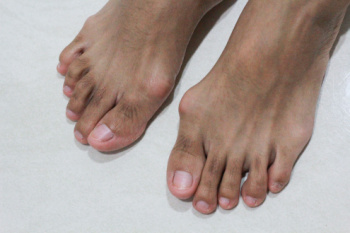
Bunions are bony protrusions that form at the base of the big toe that can become painful and lead to discomfort while walking. Several factors contribute to the development of bunions. One of the most significant causes of bunions is genetics. If bunions run in your family, you are more likely to develop them. Wearing tight, narrow, or high-heeled shoes can force the toes into an unnatural position, increasing the risk of bunions. This type of footwear can squeeze the toes and push them out of alignment over time. Additionally, certain foot shapes and structures can predispose individuals to bunions. People with flat feet or low arches may be more susceptible. Conditions such as rheumatoid arthritis can cause inflammation in the joints of the foot, potentially leading to the formation of bunions. Foot injuries or trauma can disrupt the normal alignment of the toes, promoting bunion development. Occupations that require prolonged standing or walking can increase the pressure on the toes, increasing the likelihood of bunions. Lastly, bunions tend to develop more frequently as individuals age and wear and tear on the joints accumulate over time. If you have a bunion that is causing you discomfort, it is suggested that you schedule an appointment with a podiatrist who can talk to you about treatments that are right for you.
If you are suffering from bunion pain, contact one of our podiatrists of Princeton Foot and Ankle Associates. Our doctors can provide the care you need to keep you pain-free and on your feet.
What Is a Bunion?
Bunions are painful bony bumps that usually develop on the inside of the foot at the joint of the big toe. As the deformity increases over time, it may become painful to walk and wear shoes. Women are more likely to exacerbate existing bunions since they often wear tight, narrow shoes that shift their toes together. Bunion pain can be relieved by wearing wider shoes with enough room for the toes.
Causes
- Genetics – some people inherit feet that are more prone to bunion development
- Inflammatory Conditions - rheumatoid arthritis and polio may cause bunion development
Symptoms
- Redness and inflammation
- Pain and tenderness
- Callus or corns on the bump
- Restricted motion in the big toe
In order to diagnose your bunion, your podiatrist may ask about your medical history, symptoms, and general health. Your doctor might also order an x-ray to take a closer look at your feet. Nonsurgical treatment options include orthotics, padding, icing, changes in footwear, and medication. If nonsurgical treatments don’t alleviate your bunion pain, surgery may be necessary.
If you have any questions, please feel free to contact our offices located in Princeton, and West Windsor, NJ . We offer the newest diagnostic and treatment technologies for all your foot care needs.
